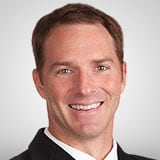Back in 2012, everything seemed to be going wrong for Best Buy; now, the company could be the best turnaround play of 2013, says Tyler Laundon of the 100% Letter.
Restructuring charges and other items resulted in a net loss of $1.7 billion in the quarter ending in March. Rumors of bankruptcy began to swirl.
The company's CEO, Brian Dunn, resigned abruptly in April, 2012. And the stock was plummeting. Best Buy (BBY) shares had fallen by more than 70% from April, 2007. It looked like it would follow Circuit City into liquidation.
But Best Buy is refusing to die. It has made some massive changes. It's beginning to fight back, reinventing itself and working to give customers what they want.
Wall Street is now getting back on board, as evidence mounts that this turnaround story will have a fairytale ending for those long BBY shares. Since Dunn resigned, the shares are up more than 50%, even though the company is still losing money.
All great turnaround stories begin at the top and BBY is no different. Leading the charge are two executives better suited than Dunn (who rose through the ranks from salesperson to CEO) to navigate the new world of retail; Hubert Joly as CEO (hired August, 2012) and Sharon McCollam as CFO (hired December, 2012).
Joly's previous posts as CEO of Carlson Travel and as a partner with McKinsey & Company will refocus BBY on the customer, and he should implement a systematic approach to rebuilding the company.
McCollam was previously CFO and CEO for Williams-Sonoma, so she has great experience in the retail (an importantly, online retail) environment. Both of these executives appear to be winners.
Led by Joly and McCollam, BBY appears to be focused on the future and not what may have worked in the past. The team is creating a new vision and culture at a company with great brand recognition, but horrible customer satisfaction.
Almost all of the following catalysts are a result of new management, a new vision, and deliberately revamped operations. These guys will lead the charge.
Another major improvement to the BBY shopping experience is a revamped store layout. This gets rid of odd product categories (like musical instruments) and allocates more space and focus to revenue generators, including appliances, mobile, and tablets.
Best Buy has recently inked deals with both Samsung and Microsoft to operate in-store brand name shops. These vendor agreements show that major software and hardware companies see value in brick and mortar locations, and that online only isn't the future.
Let me be clear however-story won't unfold in a month, or even just in 2013. It's going to take time and a lot of hard work to establish high levels of customer loyalty and revenue and profit growth.
But progress is already being made and BBY's new management team appears well suited to do this job. Efficiency measures should have a more immediate impact than growth initiatives.
While there are a lot of moving parts to model here, it's reasonable to assume that within the next three years, BBY should be able to earn around $3.00 per share-about $0.10 less than it earned in both 2010 and 2011.
Upside could be much more, but assuming $3.00 is reasonable, the stock trades with a forward P/E of just 9.4-dirt cheap compared to comps like Williams-Sonoma and Costco, which trade at 18 to 22-times forward earnings.
Given its upside potential, cheap valuation, and 2.3% dividend yield, Best Buy is a great buy. Let's add a first position in these shares.
Subscribe to the 100% Letter here.
More from MoneyShow.com:
Phone Books Go Digital with Yelp
It's Not So Bad in Oracle-Land
Qualcomm: Unmatched in Wireless